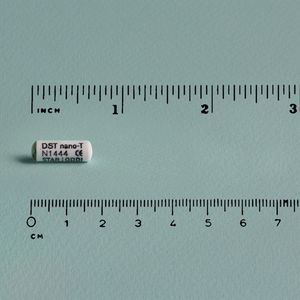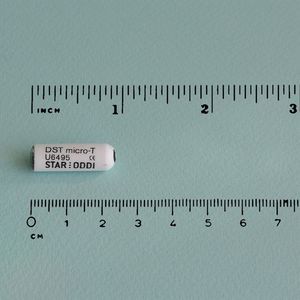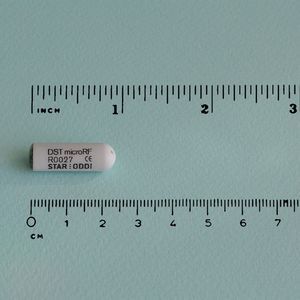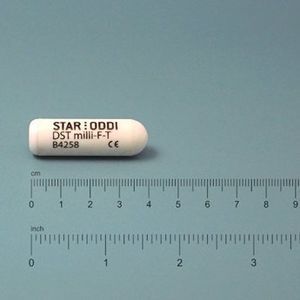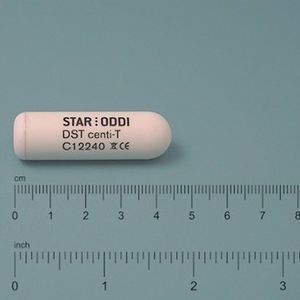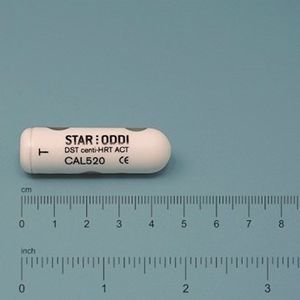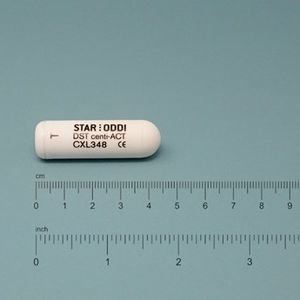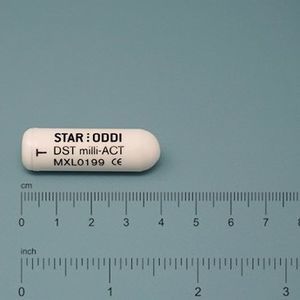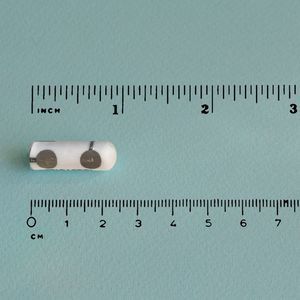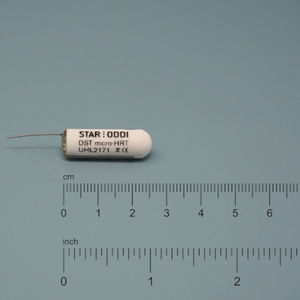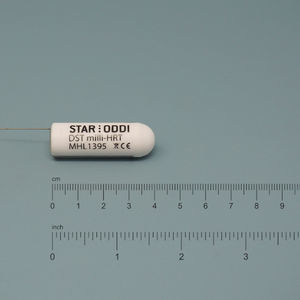
Registrador de dados de temperatura DST micro-ACTpara pesquisa com animaisimplantável
Guardar nos favoritos
Comparar
Você quer comprar diretamente? Visite nossa loja.
Características
- Tipo de dados
- de temperatura
- Aplicações
- para pesquisa com animais
- Outras características
- implantável
- Temperatura
45 °C
(113 °F)- Diâmetro
8,3 mm
(0,3 in)
Descrição
Product Overview: Overview of changes in animal activity over time. Minimally invasive, simple to implant and explant. On-board calculation of acceleration statistics from 3-axis accelerometer data. Ideal for use in studies on small captive and free-ranging animals. Key Features: Statistical and raw 3-axis accelerometer data Minimally invasive Small size (3.3g) Stress-free long-term studies Guaranteed accuracy and performance Product Details: Each activity measurement is comprised of a burst activity measurement over one minute with a user programmable sampling frequency of 0.03Hz-10Hz. Statistical parameters are calculated on-board, based on the dynamic body acceleration of the animal. Raw accelerometer measurements can be stored in the logger’s memory for further processing. The DST micro-ACT simultaneously measures long term activity and core body temperature in the animal. The logger is simple to implant and explant and is made from ceramic housing to guarantee biocompatibility. This bio-logger is ideal for a variety of studies including those looking at behaviour, pre-clinical vaccine efficacy and stress response. It is suitable for use in laboratory, domestic and wildlife animal research, including studies on animal welfare and is suitable for use in all biosafety levels. Measuring acceleration derived activity gives researchers the chance to get an overall view of changes in the study animals’ activity over time. The DST activity loggers measure acceleration in three dimensions, in relation to earth‘s gravity field. Each activity measurement is composed of a burst activity measurement over one minute with a chosen sampling frequency of 0.03Hz-10Hz. The logger has a battery life of over 13 months, when sampling every 15 minutes at a 1Hz sampling frequency. The logger is especially useful when a comprehensive data set throughout the research period is needed with no disturbance to the animal. Since no data is transmitted there are no housing or environmental restrictions that apply to the data collection. Optionally, the loggers can be programmed with multiple different intervals within a study. This can, for example, be useful when different intervals are preferred during the day or night and can optimize battery life and save memory at the same time. Every logger is individually calibrated for temperature and comes with a calibration certificate. In addition, a static calibration is performed on the acceleration values eliminating the need for the user to normalize the data. The loggers’ accuracy and performance are guaranteed for one year after purchase. Usage: Simple in use, from setup to data retrieval. The logger and the accompanying accessories are designed for ease of use throughout the research process, from setting up the logger, implanting it, to retrieving and analysing the data. The logger is supported by the Mercury software and a Communication Box which need to be purchased with the first order. To start the logger for measurements it is placed into a Communication Box and connected to the software. The Communication Box serves as an interface between the logger and a PC computer. In the application software, the user sets the start time, start date and sampling interval before starting the recorder. Each activity measurement is recorded over a one minute period with a 3-axis accelerometer, using a user programmable sampling frequency of 0.03Hz-10Hz. The on-board algorithm of the logger provides six statistical parameters for each one minute measurement including: minimum, maximum and average EA* values, variance of EA, skewness and kurtosis. Raw accelerometer data can be stored for additional calculations. *EA stands for “external acceleration”, an individually calibrated and normalized variable comparable to the vectoral sum of the dynamic body acceleration (VeDBA). Different measurement intervals can be set for the same study. This is especially useful when more or less frequent measurements are needed at a certain time period, optimizing memory space and battery life. The software automatically calculates the memory capacity based on certain interval settings, making it easier for the user to decide how to program the logger and design the study. Estimated battery consumption during that time period is also calculated. After recovering the logger, the logger is inserted into the communication box and the recorded data is uploaded to the software. The results are displayed both in graphic and tabular form and the data can be exported to other programs. After retrieving the data the logger can easily be sterilized and reused as long as the battery lasts. Current battery life can be viewed in the software and the user can get an estimate of how long the logger memory and battery will last in a planned research. All Star-Oddi loggers are implantable grade, hermetically sealed and waterproof with high pressure tolerance. Therefore, the battery is not replaceable. Accessories: Communication box: Serves as an interface between the logger and a PC computer. Used for connecting to the DST, when starting the logger and retrieving data. DST is inserted into the hole of the box for wireless communications. The box comes with a USB cable for connecting to a PC computer. Mercury software: Graphical Windows supporting software for the laboratory and wildlife sectors. Offers various options for measurement setup and graphical and tabular view of retrieved data. The data can easily be exported to other programs and all updates are free of charge. Implantation: Due to the leadless design and small size of the loggers, implantation is simple and minimally invasive. The DST micro-ACT is suitable for small animals such as rats and other small rodents, small bird and fish. The loggers can be sterilized and reused for as long as the battery lasts. As Star-Oddi’s loggers contain electronics not all sterilization methods are suitable; this includes methods where temperature exceeds 60°C. Specifications: Sensors: Activity (3-axes acceleration) and temperature Size (Diameter x Length): 8.3 mm x 25.4 mm Housing Material: Alumina (Ceramic) Weight: 3.3g Data Resolution: 12 bit (Temperature), 13 bit (Acceleration) Acceleration Resolution: 2 mg Temperature Range: 5°C to +45°C (41°F to 113°F) Temperature Resolution: 0.032°C (0.058°F) Temperature Accuracy: +/-0.2°C (0.36°F) Memory Type: FRAM Memory Capacity: 52,429 measurements per sensor (if all parameters are recorded simultaneously) Memory Capacity Bytes: 1,048,575 bytes / temperature 2 bytes, acceleration statistics 18 bytes Measurement Interval: User specified in minutes or hours Minimum Measurement Interval: 2 minutes Multiple Intervals Option: Up to 7 different intervals Measurement Options (Primary/Secondary): T OR T+ACT Data Retention: 25 years Clock: Real time clock. Accuracy +/-1 min/month Communications: Communication Box, wireless transmission when logger is placed in the box. Connection to PC: USB cable. Attachment Hole: 0.9 mm (in diameter) Battery Life: 19-154 days (for 1Hz sampling frequency over 1 minute. Sampling interval 2-20min. Activity and temperature recorded simultaneously.) Accelerometer Sampling Frequency: 0.03Hz-10Hz Duration of ACT Measurement: 1 minute
Catálogos
Não estão disponíveis catálogos para este produto.
Ver todos os catálogos da Star-OddiOutros produtos Star-Oddi
Animais de laboratório, domésticos e selvagens
* Os preços não incluem impostos, transporte, taxas alfandegárias, nem custos adicionais associados às opções de instalação e de ativação do serviço. Os preços são meramente indicativos e podem variar em função dos países, do custo das matérias-primas e das taxas de câmbio.



